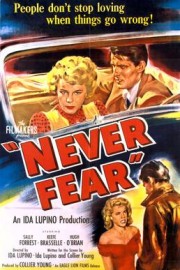Never Fear
Ida Lupino was a filmmaker whom worked in melodrama, but landed strong emotional punches. Case in point- I was in tears watching “Never Fear,” a film that- were it made now- would be a Lifetime weepy, not the work of an important filmmaker in movie history. One of the reasons Lupino was such a great filmmaker is how she focused on the inner emotions of her characters, even when that leads to moments that can play as silly now. She understands the heart of the story, and the importance of internal resilience. That introspective storytelling is what matters most.
“In sickness and in health” is an idea that has been a part of wedding vows for generations, but it’s not really something people think about unless they are faced with it. I’ve experienced it first hand, not only in my own marriage- where we both have chronic health issues- but our parent’s marriages. My father had heart issues the last 18 months of his life; when my mom had to retire for her own physical reasons, she saw it as a sign that life meant for her to be there for my dad until his death in October 2013. My mother-in-law had health issues as long as I’ve been with my wife, and it lead to my father-in-law- and the family in general- taking care of her until she passed away on New Year’s Day 2023. For me, that part of the vows means something that I think about every day, and even though Carol and Guy are not married in “Never Fear,” we see a relationship at a crossroads, and the way the pair deal with it says a lot about whom they are.
At the beginning of the film, Carol (Sally Forrest) and Guy (Keefe Brasselle) are on their way to great success as a pair of entertainers, and marriage is something on the horizon. One day during rehearsals, Carol falls down, seemingly exhausted, which her father (Herb Butterfield) thinks is due to their relentless schedule. The prognosis is more severe, though; Carol has polio. As she begins treatment and rehabilitation, she cuts herself off from Guy and her father, and it is hard for her to accept the road ahead being a long, and difficult one. All the while, Guy puts his own career on hold, as he wants to be there for Carol. Does she still want him, though?
The moment something dramatic changes in our health, it’s natural to not only feel cutoff from our loved ones, but also feel like we have to go through it alone. Part of what makes the screenplay by Lupino and Collier Young- inspired by Lupino’s own struggle with polio- so effective is that not only does it center itself on Carol’s journey, but it also has Guy as someone who’s struggling as well. His struggle is certainly less vital to our emotional connection to the story, but if Guy were simply someone who’s all about his career, or whom doesn’t have concerns about his ability to be there for Carol, any impact on Carol’s journey is lessened. The scenes we have of Guy on the outside of the facility Carol is in informs us of how he thinks of her, and how this is something that both partners go through, not just the one effected. It feels ham-fisted, at times, but it’s also honest. Forrest definitely gives the stronger performance of the two, but Brasselle has some key moments where you see the challenges he’s facing come through, allowing us to feel as though this film earns the ending it gets. “Never Fear” got me emotional not because of the manipulations of melodrama, but because I’ve seen so much of what I saw on the screen play out in real life, and it’s something that resonates with me because it gets to the struggle of not just being someone who needs extra support, but the one who sometimes needs to step up and be extra supportive.










